初中英语新目标(Go for it)版 九年级Unit 2 I think that mooncakes are delicious!_L4
《新目标英语》(Go for it)
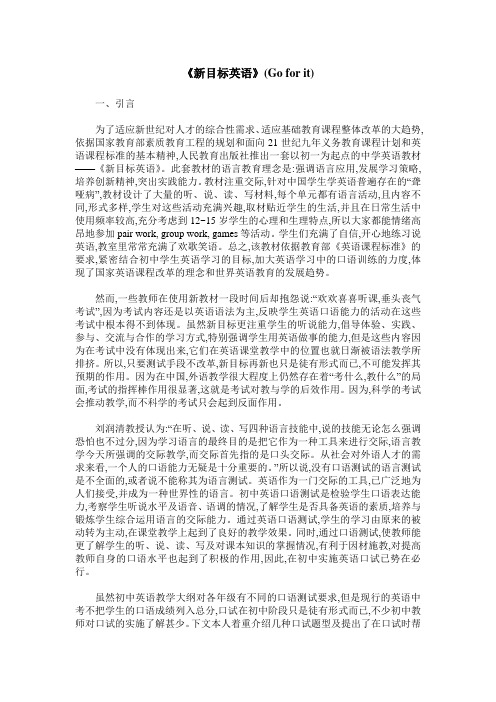
《新目标英语》(Go for it)一、引言为了适应新世纪对人才的综合性需求、适应基础教育课程整体改革的大趋势,依据国家教育部素质教育工程的规划和面向21世纪九年义务教育课程计划和英语课程标准的基本精神,人民教育出版社推出一套以初一为起点的中学英语教材——《新目标英语》。
此套教材的语言教育理念是:强调语言应用,发展学习策略,培养创新精神,突出实践能力。
教材注重交际,针对中国学生学英语普遍存在的“聋哑病”,教材设计了大量的听、说、读、写材料,每个单元都有语言活动,且内容不同,形式多样,学生对这些活动充满兴趣,取材贴近学生的生活,并且在日常生活中使用频率较高,充分考虑到12~15岁学生的心理和生理特点,所以大家都能情绪高昂地参加pair work, group work, games等活动。
学生们充满了自信,开心地练习说英语,教室里常常充满了欢歌笑语。
总之,该教材依据教育部《英语课程标准》的要求,紧密结合初中学生英语学习的目标,加大英语学习中的口语训练的力度,体现了国家英语课程改革的理念和世界英语教育的发展趋势。
然而,一些教师在使用新教材一段时间后却抱怨说:“欢欢喜喜听课,垂头丧气考试”,因为考试内容还是以英语语法为主,反映学生英语口语能力的活动在这些考试中根本得不到体现。
虽然新目标更注重学生的听说能力,倡导体验、实践、参与、交流与合作的学习方式,特别强调学生用英语做事的能力,但是这些内容因为在考试中没有体现出来,它们在英语课堂教学中的位置也就日渐被语法教学所排挤。
所以,只要测试手段不改革,新目标再新也只是徒有形式而已,不可能发挥其预期的作用。
因为在中国,外语教学很大程度上仍然存在着“考什么,教什么”的局面,考试的指挥棒作用很显著,这就是考试对教与学的后效作用。
因为,科学的考试会推动教学,而不科学的考试只会起到反面作用。
刘润清教授认为:“在听、说、读、写四种语言技能中,说的技能无论怎么强调恐怕也不过分,因为学习语言的最终目的是把它作为一种工具来进行交际,语言教学今天所强调的交际教学,而交际首先指的是口头交际。
人教新目标版九年级英语全册中考考纲词汇详解:Unit 2 I think that mooncakes are delicious!
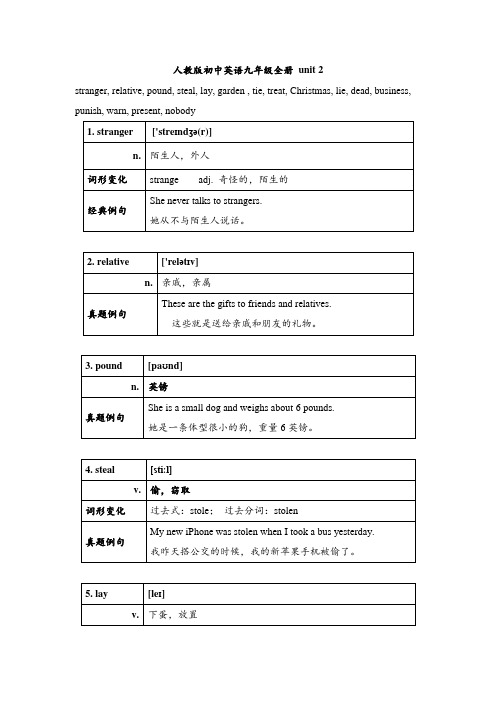
如果你感觉不舒服,就躺下休息吧。
11.dead
[ded]
adj.
死的,无生命的
词形变化
die v.死,去世
death n.死亡
dying adj.将死的,奄奄一息的
常考短语
be dead去世
真题例句
Our friendship was so dead that I didn’t call him even if I went home.
这些就是送给亲戚和朋友的礼物。
3. pound
[paʊnd]
n.
英镑
真题例句
She is a small dog and weighs about 6 pounds.
她是一条体型很小的狗,重量6英镑。
4. steal
[stiːl]
v.
偷,窃取
词形变化
过去式:stole;过去分词:stolen
真题例句
领带,领结
真题例句
It’s a wise choice to wear the white tie. It matches your shirt well.
戴这个白色领带是个明智的选择,它很搭配你的衬衫。
8. treat
[triːt]
v.
对待,治疗,请客
习惯用语
trick or treat不请客就捣蛋
你可以把钥匙放在桌子上。
6. garden
['ɡɑːdn]
n.
花园
常考短语
in the garden在花园里
真题例句
Mike was reading in the garden when his mother came.
初中英语新教材Goforit!Unit2说课稿
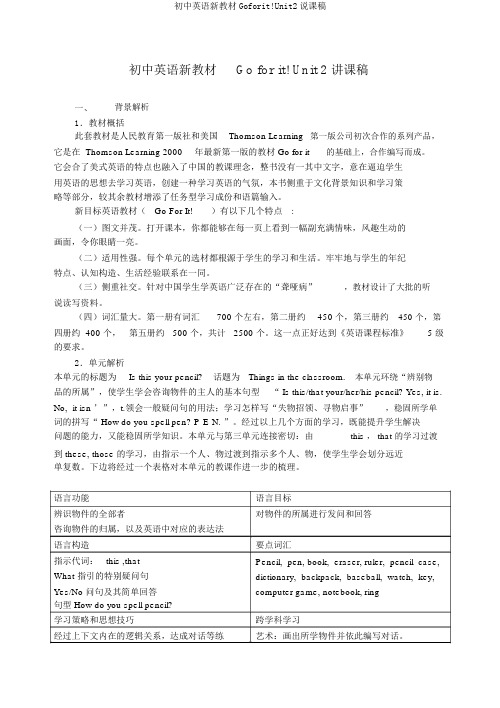
初中英语新教材Go for it! Unit 2 讲课稿一、背景解析1.教材概括此套教材是人民教育第一版社和美国Thomson Learning第一版公司初次合作的系列产品,它是在 Thomson Learning 2000年最新第一版的教材Go for it的基础上,合作编写而成。
它会合了美式英语的特点也融入了中国的教课理念,整书没有一其中文字,意在逼迫学生用英语的思想去学习英语,创建一种学习英语的气氛,本书侧重于文化背景知识和学习策略等部分,较其余教材增添了任务型学习成份和语篇输入。
新目标英语教材(Go For It!)有以下几个特点:(一)图文并茂。
打开课本,你都能够在每一页上看到一幅副充满情味,风趣生动的画面,令你眼睛一亮。
(二)适用性强。
每个单元的选材都根源于学生的学习和生活。
牢牢地与学生的年纪特点、认知构造、生活经验联系在一同。
(三)侧重社交。
针对中国学生学英语广泛存在的“聋哑病”,教材设计了大批的听说读写资料。
(四)词汇量大。
第一册有词汇700 个左右,第二册约450 个,第三册约450 个,第四册约 400 个,第五册约500 个,共计2500 个。
这一点正好达到《英语课程标准》 5 级的要求。
2.单元解析本单元的标题为Is this your pencil?话题为Things in the classroom.本单元环绕“辨别物品的所属”,使学生学会咨询物件的主人的基本句型“ Is this/that your/her/his pencil? Yes, it is. No, it isn ’”,t.领会一般疑问句的用法;学习怎样写“失物招领、寻物启事”,稳固所学单词的拼写“ How do you spell pen? P-E-N. ”。
经过以上几个方面的学习,既能提升学生解决问题的能力,又能稳固所学知识。
本单元与第三单元连接密切:由this , that 的学习过渡到 these, those 的学习,由指示一个人、物过渡到指示多个人、物,使学生学会划分远近单复数。
新目标版(Go for it)2019-2020学年初中英语九年级全册Unit 2 I think that mooncakes are delicious! 单

新目标版(Go for it)2019-2020学年初中英语九年级全册Unit 2 I think that mooncakes are delicious! 单元练习A卷一、单选题 (共15题;共30分)1. (2分)— What else would you like to eat?— ______ I'm full. Thanks.A . Nothing else.B . Else nothing.C . Something else.D . Else something.2. (2分)—How do you usually______school?—I usually go to school______the school bus.A . get to; takeB . get: byC . get to; onD . get to; by3. (2分)Doing sports can make us ______, so our teachers often make us ______ in the morning.A . healthily; runB . health; to runC . healthy; runD . healthy; running4. (2分)The boy __________ his books and went for his dinner .A . put onB . put upC . put offD . put away5. (2分)I don't know _____ I am free this afternoon.A . thatB . ifC . whatD . which6. (2分)—— fantastic documentary it is!——Do you mean the hot film “Diaoyu Island The Truth”?A . HowB . How aC . WhatD . What a7. (2分)— What music do you like?— I like music that I can sing along or dance .A . to; withB . with; withC . to; toD . with; to8. (2分)—Mary pays more and more attention to her appearance,but her mother is unaware of it.—She shouldn't do that so much.A . doesn't acceptB . doesn't realizeC . doesn't refuse9. (2分)Living alone in the countryside, his father feels lonely ________.A . in timeB . from time to timeC . at a timeD . at no time10. (2分)My parents' life mine.A . was different asB . was different withC . was different fromD . were different from11. (2分)— Look at the sign! You aren't allowed _______ in public places.— Sorry, I didn't see it.A . smokeB . smokingC . to smokeD . smoked12. (2分)I usually stay ______ bed ______ Sunday morning.A . at; inB . in; onC . on; onD . for; on13. (2分)— _________ exciting news report it is!— Oh, yes. It says our school won the football final.A . What anB . WhatC . How anD . How14. (2分)—A movie called X Men 2 is on show these days. Would you like to see it with me?—Sorry. I ______ it already. But it is really exciting.A . have seenB . sawC . am seeingD . was seen15. (2分)3D printers are still _____ expensive for most of us ______ afford. ()A . so, toB . such, toC . too, toD . much, to二、完形填空 (共1题;共10分)16. (10分) Are the days 1 in summer or in winter? In China, the days 2 longer in summer. There are 3 than sixteen 4 of daylight in the middle 5 summer. In 6 , there are only about eight hours of 7. When is the weather warmest in China? It is the 8 during the summer months. During the winter, it is often very 9. In spring and autumn, the weather is usually neither very hot nor very cold. The south has a 10 summer. The north has a cold winter.(1)A . longerB . longestC . long(2)A . isB . amC . are(3)A . manyB . muchC . more(4)A . daysB . hoursC . years(5)A . ofB . onC . at(6)A . springB . winterC . summer(7)A . dayB . lightC . daylight(8)A . warmB . warmestC . warmer(9)A . wetB . hotC . cold(10)A . coldB . rainC . hot三、阅读理解 (共3题;共30分)17. (10分) A plant makes its own food in its leaves . Water comes to the leaves through the roots . Air gets into the leaves through very small holes . The green coloring in the leaves uses the water and air to make the food for the plant . It also needs sunshine because a plant can make food only when the sun is shining.Animals and people could not live without green plants . They both eat plants . People and some animals also eat the meat of some animals and these animals eat plant(1)A plant gets food from________A . the sunB . its leavesC . its rootsD . its roots(2)What does the green coloring use to make the food for a plant?A . Sunshine ,water ,air and the rootsB . Air ,sunshine and waterC . Water ,air and meatD . Water ,sunshine and animals(3)A plant has very small holes in its leaves for__________ to come in.A . airB . waterC . sunshineD . green coloring(4)A plant can make its food when it is _______.A . cloudyB . rainyC . sunnyD . windy(5)People would die without________A . animalsB . meatC . plantsD . leaves18. (10分)阅读理解Different types of maps have differentuses. Tourist maps, for example, havesigns to show places of interest in anarea. When tourists read these maps, itis easy for them to find where to go andwhat to see in a place and it is easyfor them to go and find their ways tothese places.Road maps show large areas so that people canplan long journeys. Different types of roadsare given different numbers. For example, ifyou want to go to Wood Green, you just followNo. 621 Road and keep looking at the roadsigns.Distribution maps (分布图) use colorsor signs to show facts about an area.For example, where different languagesare spoken, how many people live in anarea, how cold and hot some places are,or whether a place is short of water.Some maps, such as railway maps, use straightlines to show everything. This is easy forpeople to read. Trains are fast. People don'thave to think about small places they go past.They just need to know the two ends of theirtrips.(1)Jim wants to visit some places of interest. Which map does he need most?A . A road map.B . A tourist map.C . A distribution map.D . A railway map.(2)How can you tell different roads on Road maps?A . By finding the numbers.B . By using different colors.C . By using straight lines.D . By looking at the road signs.(3)Which of the following can Distribution maps tell us?A . How to get to Germany.B . How to plan a long journey.C . Which place is short of water.D . Where a famous museum is.(4)Why do railway maps use straight lines?A . Because railways are straight.B . Because people like straight lines.C . Because people can read them easily.D . Because railways have only two ends.(5)Which is the best title for the passage?A . Learn to Design MapsB . Get to know Different MapsC . Buy a Railway Map for yourselfD . Draw Maps for Geography Students19. (10分)根据短文内容选择正确答案。
(完整word)最新人教版新目标Goforit英语九年级单词表(全)

Words and Expressions in EachUnit (Book 9 )Unit 1 How can we become good learnerstextbook /tekstbuk/ n. 教科书;课本p.1 conversation /k ?nv ?se??n/, n. 谈话;发言p.2 aloud / ?laud/ adv. 高声地;出声地p.2 pronunciation /pr ?n?nsieI ?n/ n. 发音;读音p.2 sentence /sent?ns/ n. 句子p.2patient /pei ?nt/ adj. 有耐心的n. 病人 p.2 expression /ikspre ?n/ n. 表达(方式);表示p.3 discover /dIsk ?v ? (r)/ v. 发现;觉察p.3secret /si:kr ?t/ n. 奥密; adj. 奥密的; p.3fall in love with 爱上;与 ??相爱 p.3grammar /gr ?m? (r)/ n. 语法p.3repeat /ripi:t/ v. 重复;重做p.4note /n ?ut/ n. 笔录;记录v. 注意;指出 p.4pal /p ?l/ n. 朋友;伙伴p.4pattern /p ?tn/, /p ?t?n/ n. 模式;方式p.4 physics /fiziks/ n. 物理;物理学p.4chemistry /kemistri/ n. 化学p.4partner /pa:(r)tn ? (r)/ n. 搭档;伙伴p.5 pronounce /pr ?nauns/ v. 发音 p.5 vocabulary increase /Inkri:s/ v. 增添;增添p.5speed /spi:d/ n. 速度v.加快p.5ability / ?bil ?ti/ n. 能力;才能p.6brain /brein/ n. 大脑p.6active / ?ktiv/ adj. 活跃的;踊跃的 p.6attention / ?ten ?n/ n. 注意;关注p.6pay attention to 注意;关注p.6connect /k ?nekt/ v. (使)连结;与 ??有联系p.6 connectwith 把 ??和 ??连结或联系起来p.6 overnight / ? u v? (r)nait/adv.一夜之间;在夜间p.6 review /rivju:/ v. & n. 回首;复习p.6 knowledge /n ?lid ?/, n. 知识;学识 p.6wisely /waizli/ adv. 理智地;聪慧地p.6Annie / ?ni/ 安妮(女名)p.2Alexander Graham Bell 格雷厄姆? 贝尔 p.6 Unit 2 I think that mooncakes are delicious!lantern /l ?nt ? (r)n/ n. 灯笼 p.9stranger /streind ?? (r)/ n. 陌生人 p.10relative /rel ?tiv/ n. 家属;亲戚p.10put on 增添(体重);发胖p.10pound /paund/ n. 磅(重量单位);英镑 p.10folk /f ?ul k/ adj. 民间的;风俗的p.11goddess /g?des/ n. 女神 p.11steal /sti:l/ v. (stole /st ?u l/, stolen /st ?u l?n/)偷;盗取 p.11lay /lei/ v. (laid /leid/, laid)搁置;安置;产(卵);下(蛋) p.11lay out 摆开;部署p.11dessert /di ’z?:(r)t/ n (饭后)甜点;甜食p.11 garden /ga:(r)dn/ n. 花园;园子p.11admire / ?dmai ? (r)/ v. 赏识;敬慕p.11tie /tai/ n. 领带 v. 捆;束p.12haunted /h ?:ntid/ a. 有鬼魂出没的;闹鬼的p.13 ghost /g ?ust/ n. 鬼;鬼魂p.13trick /trik/ n. 把戏;把戏p.13treat /tri:t/ n. 款待;款待 v. 款待;请客p.13 spider /spaid ?r)/ n. 蜘蛛p.13Christmas /krism ?s/n. 圣诞节p.14fool /fu:l/ n. 蠢人;傻瓜 v. 捉弄 adj. 愚笨的 p.14 lie /laI/ v. (lay /leI/, lain /leIn/) 平躺;处于 p.14 novel /n ?vl/, /na:vl/ n. (长篇)小说p.14eve /i:v/ n (尤指宗教节假日的)前夕;前夕p.14 bookstore /bukst ?:(r)/ n. 书店p.17dead /ded/ adj. 死的;失掉生命的p.14 business /bizn ?s/ n. 买卖;商业p.14punish /p ?nis/ v. 处分;处罚p.14warn /w ?:(r)n/ v. 警示;劝告p.14present /preznt/ n. 此刻;礼品 adj. 此刻的p.14 nobody /n ?ub?di/, /n ?uba:di/ pron. 没有人p.14 warmth /w ?:(r)m θ / n. 暖和;暖和p.14spread /spred/ v. 流传;睁开n. 延伸;流传 p.14第1页共8页Macao /m ?kau/澳门p.10Chiang Mai /t ?i?n maI/, /d ?a:nmaI/清迈(泰城市)Halloween /h ?l?ui:n/万圣节前夕p.13St. /seint/ Valentine ’ s /v?l?ntainz/ Day情人节Clara /kla:r ?/, /kler ?/克拉拉(女名)p.10Santa /s?nt?/ Claus /kl ?:z/ 圣诞老人p.14 Charles /t ?a:(r)lz/ Dickens /dik ?nz/查尔斯? 狄更斯(英)p.14Scrooge /skru:d ?/ 斯克鲁奇 n.(非正式)小气鬼Jacob /d ?eik ?b/ Marley /ma:(r)li/ 雅各布 ? 马利Unit 3 Could you please tell me where the restrooms are?restroom /restru:m/ n. (美)卫生间;公共卫生间p.17stamp /st ?mp/ n. 邮票;印章p.17postcard /p ?u stka:(r)d/ n. 明信片p.18pardon /pa:(r)dn/ interj. 请再说一遍; p.18 washroom /w ??ru:m/, n. 卫生间;卫生间 p.18 bathroom /ba: θ ru:m/ n. 浴室;卫生间p.18 quick /kwik/adj. 快的;快速的p.18rush /r ??/ v. & n. 匆促;急促p.18suggest /s?d?est/ v. 建议;建议p.19staff /sta:f/ n. 管理人员;员工p.19grape /greip/ n. 葡萄p.20central /sentr ?l/ adj. 中心的;中央的p.20mail /meil/ v. 邮寄;发电子邮件n. 邮件 p.20 east /i:st/ adj. 东方的 adv. 向东; n.东方 p.20 fascinating /f ?sineiti ?/ a.迷人的;有吸引力的p.21 convenient /k ?nvi:ni ?nt/ a. 便利的;方便的p.21 mall /m ?:l/ n. 商场;购物中心p.21clerk /kla:k/, /kl3:rk/ n. 职员p.21corner /k ?:(r)n ?(r)/ n. 拐角;角落p.21polite /p ?lait/ adj. 有礼貌的;客气的p.22 politely /p ?laitli/ adv. 礼貌地;客气地p.22 speaker /spi:k ?(r)/ n. 讲(某种语言)的人;发言者request /rikwest/ n. 要求;恳求p.22choice /t ??is/ n. 选择;精选 p.22direction /direk ?n, dairek ?n/ n. 方向;方向p.22 correct /k ?rekt/ adj. 正确的;适合的p.22 direct /direkt, dairekt/ adj.直接的;坦直的p.22 whom /hu:m/ pron. 谁;什么人p.22 address / ?dres/, / ?dres/ n. 地点;通信处p.22 faithfully /feiθ f?li/ adv.忠实地;忠诚地p.24 Italian /It ?li ?n/ a. 意大利人的; n. 意大利人语Kevin /kevin/凯文(男名)p.20Tim /tim/蒂姆(男名)p.20Unit 4 I used to be afraid of the dark. humorou /hju:m ?r ?s/ a.有风趣感的;风趣的p.26 silent /sail ?nt/ adj. 不说话的;缄默的p.26 helpful /helpfl/adj. 实用的;有帮助的p.26 from time to time 经常;有时p.26score /sk ?:( r)/ n. & v. 得分;打分p.26 background /b ?kgraund/ n. 背景 p.27interview /Int ? (r)vju:/ v. 采访;面试 n.访谈 p.27 Asian /ei ?n, / a. 亚洲 /人的; n. 亚洲人p.27 deal with 对付 ; 对付p.27dare /de ?/, /der/ v. 敢于;胆敢 p.27private /praiv ?t/ adj. 个人的;私密的p.27 guard /ga:(r)d/ n. 警卫;看守 v. 保卫;捍卫p.27 require /rikwai ?(r)/ v. 需要;要求p.27 European /ju( ?)r ?pi: ?n/ a. 欧洲人的 p.28British /briti ?/ adj. 英国的;英国人的p.28 speech/spi:t ?/ n. 发言;发言p.28ant / ?nt/ n. 蚂蚁p.29 insect /insekt/ n. 昆虫p.29influence /influ ?ns/ v. & n. 影响p.30seldom /seld ?m/ adv. 不常;极少p.30proud /praud/ adj. 骄傲的;骄傲的 p.30be proud of 为??骄傲;感觉骄傲p.30absent / ?bs?nt/ adj. 缺席;不在p.30fail /feil/ v. 失败;未能(做到)p.30 examination /igz ?minei ?n/ n. 考试;审察 p.30 boarding /b ?:(r)di ? / school 寄宿学校 p.30in person 亲身;亲身p.30 exactly /igz ?ktli/ adv. 切实地;精准地p.30 pride /praid/ n. 骄傲;骄傲p.30 take pride in 为??感觉骄傲p.30第2页共8页grandson /gr ?ns?n/ n. 孙子;外孙p.31 general /d ?enr ?l/ a. 广泛的;惯例的;总的n. 将军 p.32introduction /intr ?d?k?n/ n. 介绍p.32 Paula /p ?:l ?/ 葆拉(女名)p.26Alfred / ?lfrid/ 艾尔弗雷德(男名)p.26Billy /bili/ 比利(男名)p.26 Candy /k ?ndi/ 坎迪(女名)p.27 Jerry /d ?eri/ 杰里(男名);杰丽(女名)p.28 Emily /emili/ 埃米莉(女名)p.28Unit 5 What are the shirts made of? material /m ?ti ?ri ?l/ n. 资料;原料p.33 chopsticks /t ??pstiks/ n. 筷子 p.33coin /k ?in/ n.硬币p.33fork /f ?:k/ n.餐叉,叉子 p.33blouse /blauz/ n.(女士)短上衣;衬衫p.33 sliver /silv ?/ n. 银,银器;adj. 银色的p.33 glass /glas/ n.玻璃p.33cotton /k ?tn/ n.棉;棉花 p.33steel /sti:l/ n. 钢;钢铁 p.33grass /gras/ n. 草;草地P.34leaf /li:f/ n ( pl. leaves /li:vz/ ) n. 叶,叶子produce /pr ?dju:s/,v. 生产;制造;出产p.34 widely /waidli/ adv. 宽泛地;广泛地 p.34 process /pr ?uses/, v. 加工;办理p.34 France /fra:ns/, /fr{ns/ 法国p.35no matter 不论 ;不论p.35 local /l ?u kl/ adj. 当地的;当地的p.35even though 固然;即便p.35brand /br ?nd/ n. 品牌;牌子p.35 avoid / ?v?id/ v. 防止;回避p.35product /pr ?d?kt/ n.产品;制品 p.35 handbag /h ?ndb ?g/ n. 小手提包p.35 mobile /m ?u bail/, /m ?ubl/ a. 可移的;非固定的Germany /d ??:(r)m ?ni/ n. 德国 p.36surface /s ?:(r)fis/ n. 表面;表层p.36 postman /p ?ustm?n/ n. 邮递员 p.36cap /k ?p/ n ( .尤指有帽舌的)帽子p.36 glove /gl ?v/ n (分手指的)手套p.36 international /int ?(r)n ??n?l/ adj. 国际的p.37 competitor /k ?mpetit ?(r)/ n. 参赛者;竞争者p.37 paint /peint/ v. 用颜料画;刷漆p.37its /its/ adj. 它的p.38form /f ?:(r)m/ n. 形式;种类p.38clay /klei/ n. 粘土;陶土p.38balloon /b ?lu:n/ n. 气球p.38scissors /siz ?(r)z/ n. (pl.) 剪刀 p.38lively /laivli/ a. 生机盎然的 ;(色彩)娇艳的p.38 fairy /fe ?ri/, /feri/ tale /teil/ n. 童话故事p.38 heat /hi:t/ n. 热;高温p.38 polish /p ?li ?/ v. 磨光;改正;润饰p.38 complete /k ?mpli:t/ v. 达成p.38 Korea /k ?ri: ?/ 朝鲜;韩国p.33Switzerland /swits ?(r)l ?nd/ 瑞士 p.35San Francisco /s ?n fr ?nsisk ?u/圣弗朗西斯科(旧金山,美国城市)p.35 Pam /p ?m/ 帕姆(女名)p.34Unit 6When was it invented?heel /hi:l/ n. 鞋跟;足跟p.42electricity /ilektris ?ti/ n. 电;电能p.42scoop /sku:p/ n.勺 ; 铲子p.42style/stail/ n. 款式 ; 款式p.42project /pr ?d?ekt/ n. 项目;工程p.42 pleasure /ple ?? (r)/ n. 快乐;快乐p.42zipper /zip ?(r)/ n. (= zip) 拉链;拉锁p.42 daily /deili/ adj. 每天的;平时的p.42website /websait/ n. 网站p.42pioneer /pai ?ni ?/ n.前锋;前驱p.42list /list/ v. 列表;列清单n. 名单;清单p.42 mention /men ?n/ v. 提到;说到p.42by accident 有时;不测处p.43nearly /ni ?li/, /nirli/ adv. 几乎;差不多 p.43boil /b ?il/ v. 煮沸;烧开p.43smell /smel/ n. 气味 v. 发出气味;闻到p.43 saint/seint/ n. 贤人;圣徒p.43take place 发生;出现p.43doubt /daut/ n. 迷惑;疑问v. 思疑 p.43 without doubt 毫无疑问;确实p.43fridge /frid ?/ n. 冰箱p.44 translate /tr ?nsleit/ v. 翻译p.44lock /l ?k/, /la:k/ v. 锁上;锁住p.44 earthquake / ?:(r) θ kweik/n. 地震p.44 sudden /s ?d?n/ adj. 忽然(的)p.44all of a sudden 忽然; 猛地p.44biscuit /biskit/ n. 饼干p.44cookie/kuki/ n. 曲奇饼干p.44 instrument /instrum ?nt/n. 器材;仪器;工具p.44crispy /krispi/ adj. 脆的;酥脆的p.45sour /sau ?(r)/ adj. 酸的;有酸味的p.45by mistake 错误地;无心中p.45customer /k ?st?m? (r)/ n. 顾客;客户p.45 Canadian /k ?neidi ?n/ a. /n. 加拿大 /人的p.46 divide /divaid/ v. 分开;分别p.46divide ... into 把??分开p.46 purpose /p ?:(r)p ?s/ n. 目的;目标p.46basket /ba:skit/ n. 篮;筐p.46the Olympics / ?u limpiks/ 奥林匹克运动会p.46 look up to 敬佩;敬慕p.46hero /hi ?r ?u / n. 英豪;男主角p.46Berlin /b ?:lin/ 柏林(德国城市)p.46NBA (National Basketball Association)国家篮球协会(美国职业篮球联赛)p.46 CBA (China Basketball Association)中国篮球协会(中国职业篮球联赛)p.46 Chelsea/t ?elsi/ Lanmon /l ?nm ?n/切尔西 ? 兰曼p.42Jayce /d ?eis/ Coziar /k ?u zia:/ 杰斯 ? 克里亚 p.42 Jamie /d ?eimi/ Ellsworth /elzw ?:(r) θ /杰米 ? 埃尔斯沃恩p.42Julie /d?u:li/ Thompson /t?mps?n/朱莉? 汤普森Whitcomb /witk ?m/ Judson /d ??ds?n/惠特科姆? 贾德森p.42Thomas /t ?m?s/ Watson /w ?ts?n/ 托马斯? 沃森George /d??:(r)d ?/ Crum /kr ?m/ 乔治? 克拉姆James /d ?eimz/ Naismith /naismiθ /詹姆斯? 奈史密斯p.46Unit 7 Teenagers should be allowed to choose their own clothes. smoke /sm ?u k/ v. 冒烟;抽烟n. 烟p.49 pierce /pi ?s/, /pirs/ v. 扎;刺破;穿透p.49 license /laIsns/n. (= licence) 证;证件p.49 safety /seifti/ n. 安全;安全性p.49earring /i ?ri ? / n. 耳环;耳环p.50cry /krai/ v. & n. 哭;叫唤p.51field /fi:ld/ n. 野外;场所p.51hug /h ?g/ n. & v. 拥抱;搂抱p.51lift /lIft/ v. 举起;抬高p.51talk back 回嘴;顶撞p.51awful / ?:fl/ adj. 很坏的;厌烦的p.51teen /ti:n/ n. 十几岁(十三至十九岁之间)regret /rigret/ v. 感觉遗憾;后悔p.51 poem /p ?ui m/ n. 诗;韵文p.51 bedroom /bedru:m/ n. 寝室p.52 community /k ?mju:n ?ti/ n. 社区;社团p.52 keep away from 防止靠近;远离p.52 chance /t ?a:ns/ n. 时机;可能性p.52 make one ’ s own decision自己做决定p.52 manage /m ?nid ?/ v. 想法做到;对付(困难场面)society /s ?sai?ti/ n. 社会p.52unit /ju:nit/ n. 单位;单元p.52 educate /ed ?ukeit/ v. 教育;教育p.52get in the way of 挡的路;阻碍p.54 professional /pr ?fe??nl/ a. 职业的;专业的p.54 enter /ent ?(r)/ v. 进来;进去p.54support /s ?p?:(r)t/ v. & n. 支持p.54 Picasso /pik ?s?u/ /毕加索(西班牙画家)p.50Unit 8 It must belong to Carla.truck /tr ?k/ n. 卡车;货车p.57 rabbit /r ?bIt/ n. 兔;野兔p.57 whose /hu:z/ adj. & pron.谁的;(特)那个人的attend / ?tend/ v.列席;参加p.58valuable /v ?lju ?bl/ a. 很实用的;可贵的p.58 pink /pink/ adj. 粉红色的 n. 粉红色p.58 picnic /piknik/ n. 野餐p.58 somebody /s ?mb ?di/ pron. 某人;重要人物 p.58 anybody /enib ?di/ pron. 任何人p.58noise /n ?iz/ n. 声音;噪音p.59policeman /p ?li:sm ?n/ n. 男警察 p.59wolf /wulf/ n. 狼p.59laboratory /l ?b?r?tri/ n. 实验室p.60coat /k ?ut/ n. 外套;外套p.60sleepy /sli:pi/ adj. 困倦的;打盹的p.60 pocket /p ?kit/ n. 衣袋;口袋p.60alien /eili ?n/ n. 外星人p.61suit /sju:t/, /su:t/ n. 西服;套装p.61express /ikspres/ v. 表示;表达p.62not only but also不只,并且p.62circle /s ?:(r)kl/ n. 圆圈 v. 圈出p.62Britain /britn/ n. (= Great Britain) 大不列颠 p.62 receive /risi:v/ v. 接受;收到p.62leader /li:d ? (r)/ n. 领导;领袖p.62 midsummer /mIidsm ?(r)/ n. 仲夏;中夏p.62 medical /medikl/ adj. 医疗的;医学的p.62 prevent /privent/ v. 阻挡;阻止p.62energy /en ?(r)d ?i/ n. 精力;力量 p.62position /p ?zi?n/ n. 地点;地方p.62burial /beri ?l/ n. 埋葬;埋葬p.62honor / ?n?/v. (= honour) 尊敬;表示敬意n. 有幸ancestor / ?nsest?(r)/ n. 祖宗;先人p.62victory /vikt ?ri/ n. 成功;成功p.62enemy /en ?mi/ n. 仇敌;仇家p.62period /pi ?ri ?d/ n. 一段时间;期间p.62 mystery /mistri/ n. 神奇;神奇事物p.64 Stonehenge /st ?u nhend ?/ 巨石阵 p.62Carla /ka:(r)l ?/ 卡拉(女名)p.57J. K. Rowling /r ?u li ? / J. K. 罗琳(英国作家)Victor /vikt ?(r)/ 维克托(男名)p.59Jean /dZ= ?i:n/ 琼(女名)p.60Paul Stoker /st ?u k ?(r)/ 保罗 ? 斯托克p.62 Unit 9 I like music that I can dance to. prefer /prif ?:(r)/ v. 更喜爱p.65Lyrics /liriks/ n. (pl.) 歌词p.65 Australian / ?streili ?n/ a. 澳大利亚 /人的n. 澳大利亚人p.66 electronic /ilektr ?nik/ a. 电子 (设施 )的p.66 suppose /s?p?u z/ v. 推测;猜想p.66 smooth /smu: e/ / adj. 光滑的;动听的p.66 spare /spe ? / adj. 安闲的;不用的p.66case /keIs/ n. 状况;真相p.66in that case 既然那样;倘若那样的话p.66war /w ?:(r)/ n. 战争;战争状态p.66director /direkt ?/ n. 导演;部门负责人p.66 dialogue /dai ?l?g / n. (=dialog) 对话;对白 p.67 documentary /d ?kjumentri/n. 纪录片p.67 drama /dra:m ?/ n. 戏;剧p.67plenty /plenti/ pron. 大批;众多p.67plenty of 大批;充分p.67shut / ??t/ v. (shut, shut) 封闭;关上p.67 superhero /su:p ?(r)hi ?r ?u / n. 超级英豪p.67 horror /h ?r ?/ n. 震撼;惧怕p.67thriller / θril@(r)/ n. 惊险电影(小说、戏剧p.67 intelligent /intelId ??nt/ a. 有才华的;聪慧的p.68 sense /sens/ v. 感觉到;意识到n. 感觉;意识 p.70 pain /pein/ n. 难过;烦恼p.70 reflect /riflekt/ v. 反应;映出p.70perform /p ? (r)f ?:(r)m/ v. 表演;履行p.70 amazing / ?meizi ? / a. 令人诧异 /喜的 p.70pity /piti/ n. 遗憾;同情p.70 total /t ?u tl/ n. 总数;共计 a. 总的;全体的 p.70in total 总合;共计p.70master /ma:st ? / n. 好手;主人v. 掌握 p.70 praise /preiz/ v. & n. 夸奖;赞誉p.70national /n ??nl/ adj. 国家的;民族的p.70 recall /rik ?:l/ v. 回想起;回想起p.70 wound /wu:nd/ n. 伤;伤口;创伤p.70 World War II 二战p.66Titanic /tait ?nik/ 《泰坦尼克号》(电影名) p.67 Carmen /ka:(r)men/ 卡门(女名)p.66Dan /d ?n/ Dervish /d ?:(r)vi ?/丹?德维什p.66Unit 10 You're supposed to shakehands.custom /k ?st?m/ n. 风俗;风俗p.73bow /bau v. 鞠躬p.73kiss /kis/ v. & n. 亲吻;接吻p.73greet /gri:t/ v. 和 ??打招呼;迎接p.74value /v ?lju:/ v. 重视;珍爱 n. 价值p.75 everyday /evridei/ adj. 每天的;平时的p.75 drop by 趁便接见;随意进入p.75capital /k ?pitl/ n. 国都;国都p.75noon /nu:n/ n. 正午;正午p.75mad /m ?d/ adj. 很生气;疯的p.75get mad 大动怒火;生气p.75make an effort 作出努力p.75traffic /tr ?fik/ n. 交通;路上行驶的车辆p.75 somewhere /s ?mwe ? / adv. 在某处;到某处p.75 passport /pa:sp ?:t / n. 护照p.76 chalk /t ??:k/ n. 粉笔p.76blackboard /bl ?kb ?:(r)d/ n. 黑板 p.76northern /n ?:(r) e(r)n/ adj. 北方的;北部的p.76 coast /k ?u st/ n. 海岸;海滨p.76 season /si:zn/ n. 季;季节p.76knock /n ?k/ v. 敲;击p.76eastern /i:st ? (r)n/ adj. 东方的;东部的p.76 worth /w ?:(r) θ / adj. 值得;有价值(的)p.76 manner /m ?n?(r)/ n. 方式;方法 (pl.) 礼貌;礼仪empty /empti/ adj. 空的;空洞的p.77basic /beisik/ adj. 基本的;基础的p.78 exchange /ikst ?eind ?/ n. & v. 互换p.78go out of one’ s way专门;分外努力p.78 make ... feel at home 使(某人)感觉亲如一家granddaughter /gr ?nd ?:t ?(r)/ n. (外)孙女p.78 behave /biheiv/ v. 表现;举止p.78 except /iksept/ prep. 除以外conj. 除了;不过elbow /elb ?u / n. 肘;胳膊p.78gradually /gr ?d?u?li/ adv. 逐渐地;渐进地p.78 suggestion /s ?d?est??n/ n. 建议p.80 Brazil /br ?zil/ 巴西p.73 Mexico /meksik ?u / 墨西哥p.73 Cali /ka:li/ 卡利(哥伦比亚城市)p.75 Colombia /k ?l?mbi ?/ 哥伦比亚(南美洲国家)Lausanne /l ?u z?n/ 洛桑(瑞士城市)p.75 Norway /n ?:(r)wei 挪威p.76Maria /m ?ri: ?/ 玛丽亚(女名)p.74Katie /keiti/ 凯蒂(女名)p.74Sato /sa:t ?/ 佐藤(日本姓氏)p.74Marie /m ?ri:/ 玛丽(女名);马里(男名)Teresa /t?ri:z ?/Lopez /l ?u pez/ 特蕾莎? 洛佩斯Marc /ma:(r)k/ LeBlanc /l ?bla: ? / 马克? 勒布朗Unit 11 Sad movies make me cry.the more the more 越越p.82 leave out 不包含;不说起;忽视p.82 friendship /frend ?ip/ n. 友谊;友谊p.82king /ki ? / n. 君主;国王p.83prime /praim/ adj. 首要的;基本的p.83 minister /minist ?(r)/ n. 大臣;部长p.83prime minister 首相;大臣p.83fame /feim/ n. 名望;名誉p.83pale /peil/ adj. 苍白的;灰白的p.83queen /kwi:n/ n. 王后;女王p.83examine /igz ?min/ v ( .认真地)检查;查验p.83 nor /n ?:(r)/ conj. & adv. 也不p.83neither ... nor既不??也不p.83 palace /p ?l?s/ n. 王宫;宫殿p.83power /pau ?(r)/ n. 权益;力量p.83wealth /wel θ / n. 财产;富饶p.83grey /grei/ a. 阴森的;惨淡的;灰色的p.84 lemon /lem ?n/ n. 柠檬p.84cancel /k ?nsl/ v. 撤消;停止p.84weight /weit/ n. 重量;重量p.86shoulder / ??uld ?(r)/ n. 肩;肩膀p.86goal /g ?ul/ n. 球门;射门;目标p.86coach /k ?ut ? / n. 教练;个人教师p.86kick /kik/ v. 踢;踹p.86 teammate /ti:meit/ n. 同队队员;队友p.86courage /k ?rid ? / n. 英勇;勇气p.86 rather /ra: e/ ?/ adv. 情愿;相当p.86rather than 而不是p.86pull /pul/ v. 拉;拖p.86pull together 同心合力;共同努力p.86relief /rili:f/ n. 轻松;解脱p.86nod /n ?d/ v. 点头p.86agreement / ?gri:m ?nt/ n. (建议或见解)一致;赞同p.86fault /f ?:lt/ n. 过错;弊端p.86disappoint /dis ?p?int/ v. 使绝望p.87Bert /b ?:(r)t/ 伯特(男名)p.82Holly /h ?li / 霍莉(女名)p.84Unit 12 Life is full of the unexpected. backpack /b ?kp ?k/ n. 背包;旅游包 p.89 oversleep v.(overslept , overslept) 睡过头 p.89 give ... a lift 捎(某人)一程p.90miss /mis/ v. 错过;未获取 p.91unexpected / ?nikspektid/ a.预料以外的;始料不及的block /bl ?k / n. 街区p.91worker /w ?:(r)k ?(r)/ n. 工作者;工人 p.91stare /ste ?/ v. 盯着看;凝望p.91disbelief /disbili:f/ n. 不信;思疑p.91above / ?b?v/ adv. 在上边;向上边prep. 在上边 p.91burn /b ?:(r)n/ v. (burnt /b ?:(r)nt/, burned /;burnt, burned) 着火;焚烧p.91alive / ?laIv/adj. 活着;有生气的p.91take off (飞机等)腾飞;仓促走开p.91till /til/ conj. & prep. 到;直到p.91west /west/ adv. 向西;朝西 adj. 向西的;西部的n. 西;西方p.91cream /kri:m/ n. 奶油;乳脂p.92boss/b?s/ n. 老板;领导p.92pie /pai/ n. 果馅饼;果馅派p.92course /k ?:(r)s/ n. 课程p.92bean /bi:n/ n. 豆;豆荚p.92 market /ma:(r)kit/ n. 市场;市集p.92 costume /k ?stju:m/ n. 服饰;装扮p.93 embarrassed /imb ?r ?st/ adj. 窘况的;害羞的p.93 announce / ?nauns/ v. 宣布;宣布 p.94spaghetti /sp ?geti/ n. 意大利面条p.94hoax /h ?u ks/ n. 骗局;恶作剧p.94 discovery /disk ?v?ri/ n. 发现;觉察 p.94lady /leidi/ n. 女士;女子p.94officer / ?fis?/ n.军官;官员p.94believable /bili:v ?bl/ adj. 可相信的;可相信的p.95 embarrassing /imb ?r ?si? / a.令人害羞的(尴尬的或愧疚的)p.95New Zealand /nju:zi:l ?nd/新西兰p.91Italy /It ?li/ 意大利p.94Mars /ma:(r)z/火星p.94Carl /ka:(r)l/卡尔(男名)p.90Orson / ?:(r)s ?n/ Welles /welz/奥森? 韦尔斯 p.94Unit 13 We're trying to save the earth! litter /lit ?(r)/ v. 乱扔 n. 垃圾;荒弃物p.97 bottom /b ?t ?m/n. 底部;最下部p.97 fisherman /fi ??(r)m ?n/ n. 渔民;垂钓的人p.97 coal /k ?u l/ n. 煤;煤块p.98public /p ?blik/ adj. 公众的;公共的n. 公众;百姓p.98ugly / ?gli/ adj. 丑恶的;难看的p.98 advantage / ?dva:ntid ?/ n. 长处;有益条件p.98 cost /k ?st/, /k ?:st/ v. 花销 n. 花销;价格p.98 wooden /wudn/ adj. 木制的;木头的p.98plastic /pl ?stik/ adj. 塑料的 n. 塑料;塑胶p.98 make a difference 相关系,作用,影响p.98 shark / ?a:(r)k/ n. 鲨鱼p.99fin /fin/ n ( .鱼)鳍p.99cut off 割掉;砍掉p.99 method /me θ ?d/ n. 方法;举措p.99cruel /kru: ?l/ adj. 残忍的;残忍的p.99harmful /ha:(r)mfl/ adj.有害的p.99 chain /t ?ein/ n. 链子;链条p.99 ecosystem /i:k ?usist?m/ n. 生态系统p.99low /l ?u / a( .数目等)减少的;低的;矮的p.99 industry /ind ?stri/ n.工业;行业p.99law /l ?:/ n. 法律;法例p.99reusable /ri:ju:z ?bl/ adj. 可重复使用的;可再次使用的p.100afford / ?f?:(r)d/ v.担当得起(结果);买得起transportation /t ?nsp?:(r)tei ?n/n. 运输业;交通运输p.100recycle /ri:saikl/ v. 回收利用;再利用p.101 napkin /n ?pkin/ n. 餐巾;餐巾纸p.101upside down 颠倒;倒转p.102gate /geIt/ n. 大门p.102bottle /b ?tl/ n. 瓶;瓶子 p.102president /prezid ?nt/ n. 负责人;主席;总统p.102inspiration /insp ?rei ?n/ n. 灵感;激励人心的人(或事物)p.102metal /metl/ n. 金属p.102 creativity /kri:eitiv ?ti/ n. 创建力;独创性WildAid /waildeid/ 野生营救协会(美国)p.99 WWF (World Wide Fund For Nature)世界自然基金会p.99Mark /ma:(r)k/ 马克(男名)p.97Jason /d ?eis?n/ 贾森(男名)p.98Ken /ken/ 肯(男名)p.102Hayes /heiz/ 海斯(姓)p.102 Jessica /d?esik?/ 杰茜卡(女名)p.102Unit 14 I remember meeting all ofyou in Grade 7survey /s ?:(r)vei/ n. 检查p.105standard /st ?nd?(r)d/ n. 标准;水平p.105row /r ?u / n. 一排;一列;一行p.105in a row 连续几次地p.105 keyboard /ki:b ?:(r)d/ n. 琴键;键盘p.105 instruction /instr ?k?n/ n. 指示;命令p.106 double /d ?bl/ v. 加倍;是 ??的两倍adj. 两倍的;加倍的p.106shall / ??l/ modal v. 将要;将会p.106 overcome / ?u v?(r)k ?m/ v.(overcame , overcome) 战胜;战胜p.107make a mess 弄得一团糟,乱七八糟p.107 graduate /gr ?d?ueit/ v. 毕业;获取学位p.107 keep one’ s cool 沉住气;保持沉着p.107ours /au ?(r)z/ pron. 我们的p.107senior /si:ni ?(r)/ a. 级别(或地位)高的p.108 senior high (school) 高中p.108text /tekst/ n. 课文;文本p.108level /levl/ n. 标准;水平p.108degree /digri:/ n ( .大学)学位;度数;程度p.109manager /m ?nid ??(r)/ n. 经理;经营者 p.109 believe in 相信;信任p.109 gentleman /d ?entlm ?n/ n. 先生 p.110graduation /gr ?d?uei ?n/ n. 毕业 p.110ceremony /ser ?m?ni/ n. 典礼;仪式p.110 congratulate /k ?ngr ?t ?uleit/ v. 庆祝 p.110thirsty / θ 3:(r)sti/ a. 口渴的;盼望的 p.110none /n ?n/ pron. 没有一个;毫无p.110task /ta:sk / n. 任务;工作p.110ahead / ?hed/ adv. 向前面;在前面p.110 responsible /risp ?ns?bl/ adj. 有责任的p.110 be responsible for 对负责任p.110 separate /sep ?reit/ adj. 独自的;分别的v. 分开;分别p.110wing /wi ?/ n. 翅膀;翼p.111Brian /brai ?n/ 布赖恩(男名)p.106Luke /lu:k/ 卢克(男名)p.106Griffin /grifin/ 格里芬(姓)p.106Trent /trent/ 特伦特(姓)p.108。
新目标(Go for it)版初中英语九年级(全一册)全册教案
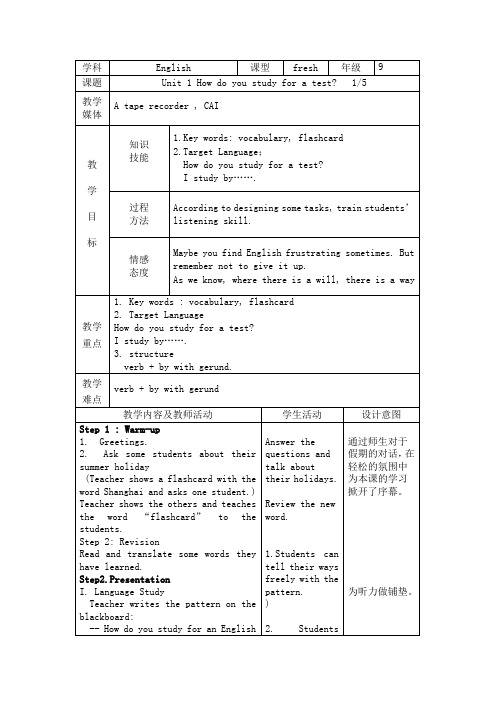
教学难点
verb + by with gerund
教学内容及教师活动
学生活动
设计意图
Step 1 : Warm-up
1. Greetings.
2. Ask some students about their summer holiday
(Teacher shows a flashcard with the word Shanghai and asks one student.)
本环节通过group work这个活动,对本单元的基本句型进行机械操练,使学生能够脱口而出。
通过两个小活动,使语言知识运用到实际交流中。
板
书
设
计
Unit 1 How do you study for a test?
Section A
The First Period
1. Ways of studying:
2. Ask some pairs to present their conversations.
3. Small competition: group in four, make sentences using structure (verb + by/with gerund).
4.Make a survey : one student interview other students using the structures (How do you study…? I study by + v-ing .)
3. Read the sample answer to the class and ask students to say the other two.
人教版新目标九年级英语Unit2Ithinkthatmooncakesaredelicious教案
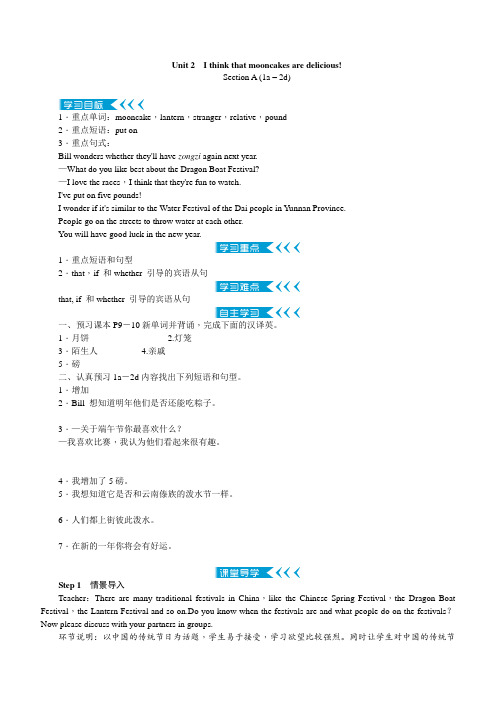
Unit 2I think that mooncakes are delicious!Section A (1a-2d)1.重点单词:mooncake,lantern,stranger,relative,pound2.重点短语:put on3.重点句式:Bill wonders whether they'll have zongzi again next year.—What do you like best about the Dragon Boat Festival?—I love the races,I think that they're fun to watch.I've put on five pounds!I wonder if it's similar to the Water Festival of the Dai people in Y unnan Province.People go on the streets to throw water at each other.You will have good luck in the new year.1.重点短语和句型2.that,if 和whether 引导的宾语从句that, if 和whether 引导的宾语从句一、预习课本P9-10新单词并背诵,完成下面的汉译英。
1.月饼________ 2.灯笼________3.陌生人________ 4.亲戚________5.磅________二、认真预习1a-2d内容找出下列短语和句型。
1.增加________________________________________________________________________2.Bill 想知道明年他们是否还能吃粽子。
________________________________________________________________________3.—关于端午节你最喜欢什么?—我喜欢比赛,我认为他们看起来很有趣。
人教版go for it九年级英语 Unit2 Section A 1 (1a – 2d) 教案
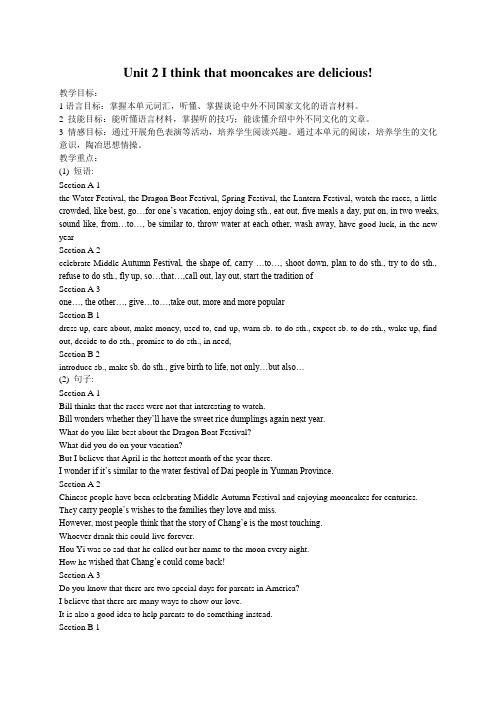
Unit 2 I think that mooncakes are delicious!教学目标:1语言目标:掌握本单元词汇,听懂、掌握谈论中外不同国家文化的语言材料。
2 技能目标:能听懂语言材料,掌握听的技巧;能读懂介绍中外不同文化的文章。
3 情感目标:通过开展角色表演等活动,培养学生阅读兴趣。
通过本单元的阅读,培养学生的文化意识,陶冶思想情操。
教学重点:(1) 短语:Section A 1the Water Festival, the Dragon Boat Festival, Spring Festival, the Lantern Festival, watch the races, a little crowded, like best, go…for one’s vacation, enjoy doing sth., eat out, five meals a day, put on, in two weeks, sound like, from…to…, be similar to, throw water at each other, wash away, ha ve good luck, in the new yearSection A 2celebrate Middle-Autumn Festival, the shape of, carry …to…, shoot down, plan to do sth., try to do sth., refuse to do sth., fly up, so…that…,call out, lay out, start the tradition ofSection A 3one…, the other…, give…to…,take out, more and more popularSection B 1dress up, care about, make money, used to, end up, warn sb. to do sth., expect sb. to do sth., wake up, find out, decide to do sth., promise to do sth., in need,Section B 2introduce sb., make sb. do sth., give birth to life, not only…but also…(2) 句子:Section A 1Bill thinks that the races were not that interesting to watch.Bill wonders whether they’ll have the sweet rice dumplings again next year.What do you like best about the Dragon Boat Festival?What did you do on your vacation?But I believe that April is the hottest month of the year there.I wonder if it’s similar to the water festival of Dai people in Yunnan Province.Section A 2Chinese people have been celebrating Middle-Autumn Festival and enjoying mooncakes for centuries.The y carry people’s wishes to the families they love and miss.However, most people think that the story of Chang’e is the most touching.Whoever drank this could live forever.Hou Yi was so sad that he called out her name to the moon every night.How he wished that Chang’e could come back!Section A 3Do you know that there are two special days for parents in America?I believe that there are many ways to show our love.It is also a good idea to help parents to do something instead.Section B 1Many would agree that when we think of Christmas, we probably think of gifts, Christmas trees and Santa Claus.A Christmas Carol is a famous novel written by Charles Dickens.He just cares about whether he can make more money.Marley used to be just like Scrooge, so he was punished after he died.He now treats everyone with kindness and warmth, spreading love and joy everywhere he goes.Section B 2Not only do people spread them around in different hiding places for an egg hunt, but they also give out these treats as gifts.教学难点:1. 学会运用宾语从句来表达句子。
人教新目标版九年级英语全册 Unit 2 I think that mooncakes are delicious!语法课件 (新版)
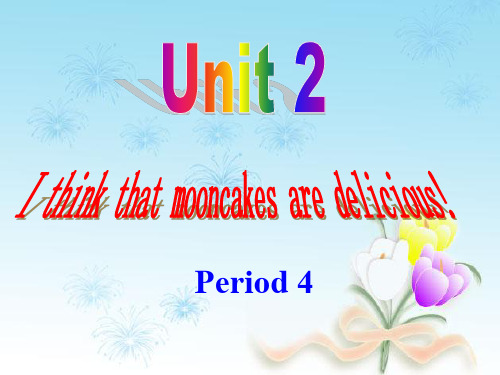
3. I don’t know __w_h__et_h_e_r__ to go or stay. 4. ____I_f ___ that is true, what should we do?
3. He asked me when wI wouoludldI lleeaavvee..
4. I don’t know what’syoyouur rnnamameeis. . 5. I don’t know what’s the matter
with you.
中考练兵场:
1. Would you please show me _____ next, Mr. Wang?
It says here, on this card, that it was used in plays. 4. 若出现两个或两上以上的由that引导的宾语从句, 且由并列连词连接时,只有第一个连词that可以省略。如: She said (that) she would come and that she would also bring her son. 她说她要来,还要带她的儿子来。
2) 从句; 主句为一般现在时,从句可为任何时态。
主句为过去时态, 从句用相应的过去时态
Do you know who she is? Please tell me how long I can keep this book. Nobody knows when he came back. He asked the policeman which is the way to the school.
新目标英语Goforit九年级上Unit2教案

新目标英语Goforit九年级上Unit2教案新目标英语(Go for it)九年级上Unit 2教案Unit 2 I used to be afraid of the dark. 第一课时 Teaching aims 本课学习谈论过去的外表、性格特征和兴趣爱好以及目前的状态。
Teaching of new lesson 1、Ask the students to describle people’s ing conversations. appearane tall, short, thin, heavy, fat, medium, height, good-looking, straight, hair curly blonde hair, a medium build, glasses, sunglasses, sports shoes 2、Ask the students to describe people’s personality. personality outgoing, easygoing, serious, funny, moody, friendly, unfriendly, shy, generous, smart 3、Then the teacher shows some photos of himself (herself) taken years ago and says to the students. I used to be short I used to have straight hair I used to wear glasses I was outgoing 4、Ask the students to work in pairs with the words above. A: Did you use to be short ? B: Yes, I did A: Did you use to have straight hair ? B: Yes, I did A: Did you use to wear glasses ? B: Yes I did A: Were you outgoing ? B: Yes, I did 5、Ask the students to talk to each other with the following sentences pattens. Did you use to be …?Did you use to have … ? Did you use to wear … ? 6、Make a dialogue. You haven’t seen your classmates for several years. Now you met in the street and talked to each other with the following words. 7、教学2a Ask students: What are they doing? Say: You will hear a boy and a girl talking to each other at a party, some people surely changed a lot. Listen and check the words you hear. 8、教学Grammar Focus 写一些句子在黑板上:You used to be short. He used to play tennis. Did you use to be short ? Did he use to have long hair ?说明used to用于陈述句而Did…use to 用于一般疑问句。
人教版go for it九年级英语 Unit 2 Section A (1a-2d)【精品课件】
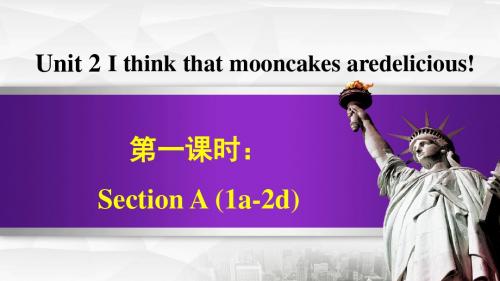
the races.
TF
1b
Mary: What a great day! Bill: Yes, it was really fun! Mary: What did you like best? Bill: I loved the races! They were really interesting to watch.
day! I’ve put on❷ five pounds❸! A:I guess the food was delicious,right?
知识点 2 put on 增加(体重);发胖 eg:I can eat whatever I want because I never put on weight. 我可以想吃什么就吃什么因为体重从来不增。
【注意】that修饰形容词时是副词,并非指示代词。
典例 —Did you wash your new suit in hot water?
—Of course not. I am not ____B____ foolish.
A.more
B.that
C.very much
D.too
【点拨】more更;that那么;very much 非常,修饰动词; too太。句意:—你把你的新衣服放热水里洗的吗?—当然没 有,我没那么愚蠢。that 相当于形容词so,意为“如此;这 样;那么”。
watch.
TF
2.Mary thinks that the teams were fantastic.
TF
3.Bill wonders whether they’ll have zongzi again next year.
TF 4.Bill and Mary believe that they’ll be back next year to watch
人教新目标Go For It!(2012)初中英语九年级全册Unit 2 I think that mooncakes are delicious!Section A

Unit 2 I think that mooncakes are delicious!教学目标:1语言目标:掌握本单元词汇,听懂、掌握谈论中外不同国家文化的语言材料。
2 技能目标:能听懂语言材料,掌握听的技巧;能读懂介绍中外不同文化的文章。
3 情感目标:通过开展角色表演等活动,培养学生阅读兴趣。
通过本单元的阅读,培养学生的文化意识,陶冶思想情操。
教学重点:(1) 短语:Section A 1the Water Festival, the Dragon Boat Festival, Spring Festival, the Lantern Festival, watch the races, a little crowded, like best, go…for one’s vacation, enjoy doing sth., eat out, five meals a day, put on, in two weeks, sound like, from…to…, be similar to, throw water at each other, wash away, have good luck, in the new yearSection A 2celebrate Middle-Autumn Festival, the shape of, carry …to…, shoot down, plan to do sth., try to do sth., refuse to do sth., fly up, so…that…,call out, lay out, start the tradition ofSection A 3one…, the other…, give…to…,take out, more and more popularSection B 1dress up, care about, make money, used to, end up, warn sb. to do sth., expect sb. to do sth., wake up, find out, decide to do sth., promise to do sth., in need,Section B 2introduce sb., make sb. do sth., give birth to life, not only…but also…(2) 句子:Section A 1Bill thinks that the races were not that interesting to watch.Bill wonders whether they’ll have the sweet rice dumplings again next year.What do you like best about the Dragon Boat Festival?What did you do on your vacation?But I believe that April is the hottest month of the year there.I wonder if it’s similar to the water festival of Dai people in Yunnan Province. Section A 2Chinese people have been celebrating Middle-Autumn Festival and enjoying mooncakes for centuries.They carry people’s wishes to the families they love and miss.However, most people think that the story of Chang’e is the most touching. Whoever drank this could live forever.Hou Yi was so sad that he called out her name to the moon every night.How he wished that Chang’e could come back!Section A 3Do you know that there are two special days for parents in America?I believe that there are many ways to show our love.It is also a good idea to help parents to do something instead.Section B 1Many would agree that when we think of Christmas, we probably think of gifts, Christmas trees and Santa Claus.A Christmas Carol is a famous novel written by Charles Dickens.He just cares about whether he can make more money.Marley used to be just like Scrooge, so he was punished after he died.He now treats everyone with kindness and warmth, spreading love and joy everywhere he goes.Section B 2Not only do people spread them around in different hiding places for an egg hunt, but they also give out these treats as gifts.教学难点:1. 学会运用宾语从句来表达句子。
我对《Go-For-it》新目标初中英语教材的简要分析

我对《Go For it》新目标初中英语教材的简要分析03班梁国生Go for it 教材作为我们一直使用的一部教材,已有了一些年头,期间,进行过一些小的修改和调整。
通过这几年我在农村边远山区中学教学的亲身体验,让我对于新目标教材有了进一步的认识,更深的理解和自己在教学实践中的体会,从教材的发展性、思想性、系统性、科学性、趣味性、前瞻性、实践性、可评价性、创造性和可拓展性等十个评价指标,谈谈对于现行教材的看法。
自教材使用以来,很多老师都认为这本教材变化大,对于广大农村学生来说,使用起来有较大的困难,除了单词量太大、知识面太广、所涉及的内容过于西化、知识体系繁杂零散且难度较大之外,它对教师的专业水平要求越来越高,把任务型教学的方法作为大力提出的主要做法,在一定程度上是影响了教学效果的达成。
其实我们应该辩证的客观的看待这本教材。
首先从教材的发展性来看。
毋庸置疑本教才是符合国家课程标准的,符合社会发展需要的。
也是符合学生身心发展规律的。
随着社会的发展进步,人类对各种文化之间交流愿望的加强,对语言工具性认识不断提高。
英语作为一种交流的工具,引起了教育届的广泛关注。
社会需要英语学科培养出一批具有交际能力的人才,而不仅仅是应试的外语学习者。
所以本教材从我国社会发展的现实状况,安排了大量的交际任务,以达成课程标准提出的目标。
从教材思想性方面来看。
这部教材同其他学科教材在跨培养文化意识的基础上,不失时机的包含了德育教育的因素。
常常把中国传统文化和其他一些有德育渗透点的内容与世界优秀文化放在同一教学活动中进行对比,让学生感受到中国文化是世界文化不可分割的一部分。
例如九年级一册中各个单元都不失时机的编排了思想教育性极强的内容,有对于Shen Nong的介绍,abacus的发明,table manners的介绍等的。
但是这样的德育因素,并不一定被教师充分的挖掘出来了。
我个人认为,教材中可以更多的加入中国元素,使其在教材,特别是文本教材中达到一定的数量。
人教新目标(Go for it)版九年级全册Unit 2 SectionA(3a-3c)说课稿

Unit 2I think the mooncakes are very delicioussection A3a-3cGo for it!Grade 9Good morning, dear judges, I’m ...It is my great honor to have this opportunity to be here and share my lesson with you. My presentation is a reading about Mid-autum festival,from unit 2 I think the mooncakes are very delicious ,Grade Nine.it’s made up of four parts.Part 1 The analysis of the teaching material1.status and fuctionThe central topic of unit 2 is festival. It is greatly related to our daily life.By the study of this unit, students should master some reading methods and understand the target language and talk about something about their favorite festivals in English and the reasons why they like this festival . At the same time, they should know and master the usage of Objective Clause. Objective Clause is of vital importance in the English study of Junior High School. To learn this unit well is quite helpful to thefollowing study, which plays a transitional role. In the senior high school entrance examination, not only do the choice questions refer to Objective Clause, but also the reading passages appear plenty of Objective Clauses.In conclusion, this unit plays a very important part in the whole English teaching process.2. The analysis of the teaching aims1) the knowledge objects:A By the end of this lesson, students can master the important words and phrases, understand the origins and customs about Mid-Autumn Festival.B Students can understand, master and talk about different festivals in English.2) the ability objectsA By the task-based activities, students can skim for the main idea of the article and scan for the specific information to improve their reading ability.B can write essays about favorite festivals and customs3)the emotional objectsA Students can develop interest to English study.B Through reading study of this unit, students can improve cultural consciousness.3.Teaching key points:By reading tasks, students can master the important words and phrases in the passage and improve reading ability.4. Teaching difficult points:A How to use objective clausesB How to use exclamatory sentences to express feelings.4.the analysis of teaching studentsThe students have learned English for several years so far. But mostof them have no good learning habits and are poor in English. However,they are familiar with Chinese myths and legends and are curious about new things and have a strong desire to learn better.so their English learning level are different from each other. They need Teacher’s help and encouragement in their further study.Part 2 the analysis of teaching methodsIn my lesson, I use the learning method of students are autonomous learning, cooperative learning and group work and discussion. At the same time, multimedia computer assisted instruction,task-based activities, situational approach, and the computer, blackboard areb used as the teaching aids.Part 3 the analysis of teaching proceduresStep 1 Warming up and lead-inStep 2 Pre-readingStep 3 While-readingStep 4 Post-readingStep 5 Summary &Homeworkstep1 Warming up and lead-in(2mins)play a song sung by Wang fei and ask Ss:what does the song mention?Lead-in the topic by presenting some pictures of Mid-AutumnFestival and new words.Purpose: Make students get involved in the theme and develop interest to this passage.step 2 pre-reading(3mins)Introduce Mid-Autumn Festival briefly.It is one of the Chinese traditional festivalsIt is on lunar August 15There is a folk story about Chang’e.Purpose: Pave the way to the following learning of the passage.step 3 while-reading(20mins)1) fast-reading3a Read the passage quickly about Mid-Autumn Festival and answer the questions and match each paragraph by skimming for the main ideas of the article,2) careful-reading3b A.Read the passage carefully. answer some questions How do people celebrate the Middle-Autumn Festival?What story is the reading about?B.Put the events in the correct order.C.Work in group and discuss 3c. Without looking at the passage, try to complete the sentences and draw mind maps andretell the story of Chang’e .In the end ,The teacher ask :what’s the meaning of “full moon,full feelings”?helps the students understand the title betterThese activities are aim to develop the spirit of cooperation and train the ability of solve problem by themselves.And develop Ss’ reading ability: scanning for the specific information and then get a deep understanding of the article.step4. post-readingWork in group and discuss paragraph2. Without looking at the passage, try to complete the sentences and write the more possible end of the story of Chang’e .These activities are aim to develop the spirit of cooperation and train the ability of imaging and writing by using target languagestep5.summary &homework(5mins)students andthe teacher make a brief summary of this class ,review the language points in the passage and assigns homework.Purpose: Make students consolidate the language points and do prepare for the next lesson.Part4Teaching reflections1.All the steps can be carried out smoothly.2.Task-based language teaching method, situational approach and group work are used.3.The teaching aims are basically achieved.4. A short amount time is left for students to write.It’s my goal to make each class better. It’s interesting, relaxing, humorous, full of love and so on. But I know, there is very difficult and still a long way to go.I ‘ll grateful to get your suggestions. That’s all, thanks for your listening.。
新版新目标英语九年级unit2知识点总结
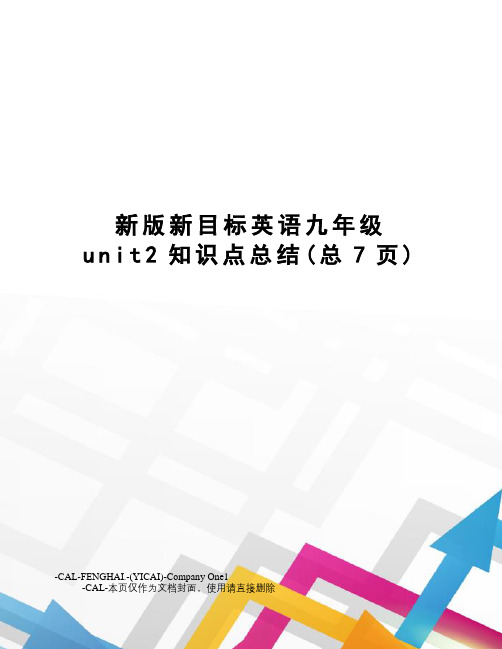
新版新目标英语九年级u n i t2知识点总结(总7页)-CAL-FENGHAI.-(YICAI)-Company One1-CAL-本页仅作为文档封面,使用请直接删除Unit2 I think that mooncakes are delicious!1.crowded 形容词,拥挤的 be crowded with 被….挤满2.wonder v想知道相当于want to know(1)后接who, what, why等连接词引导的宾语从句及“疑问词+动词不定式”结构时,想知道I wonder who that boy is.(2)后接if 或whether 引导的从句时,表示一种委婉的请求或疑问,I wonder if I could use your mobile phone.(3)后接that引导的宾语从句以及动词不定式短语时,(对….)感到惊讶I wonder to see her looking so cheerful.(4)wonder n奇迹,奇观 What are the Seven Wonders in the world?(5)wonderful 形容词3.whether 与 if(1)引导宾语从句意为是否,可以互换。
(2)引导宾语从句时,whether可直接与or not 连用,而if不可以。
I don’t know whether or not I should go.(3)if引导条件状语从句,如果,而whether不可以。
If i t doesn’t rain tomorrow, we will go camping.4. go to…for a/one’s vacation 去….度假(假期还没有开始) go on vacation 在度假holiday假日 vacation假期(1)对于英国人或者澳大利亚人来说,“假日”的意思等同于“假期”经常用holiday.(2)对美国人,“假日”是指一个特殊的日子,好像圣诞节,而“假期”是指你会花两到三周的时间\ 和你的家人出去旅行。
- 1、下载文档前请自行甄别文档内容的完整性,平台不提供额外的编辑、内容补充、找答案等附加服务。
- 2、"仅部分预览"的文档,不可在线预览部分如存在完整性等问题,可反馈申请退款(可完整预览的文档不适用该条件!)。
- 3、如文档侵犯您的权益,请联系客服反馈,我们会尽快为您处理(人工客服工作时间:9:00-18:30)。
观察与思考:
Many would agree that when we think of Christmas, we probably think of gifts, Christmas trees and Santa Claus. 这句话是意思是 许多人会认为,当我们想到圣诞节,我们可能想到礼物,圣诞树和圣诞老人 。 ______________________________________________________ that 引导、在 这是一个双重复合句。其中斜体句部分是由从属连词______ 宾语 从句。而在这个从句中,又包含一个由 整个复合句中作_______ when 引导的时间状语从句。 _______ if 除了由从属连词that引导表示陈述句的宾语从句外,还有_______ 或者 whether ______引导表示“是否”的宾语从句。
spending To see how others are _______ __________ Christmas this year. He sees that he is ______ dead but nobody cares _____________.
the Ghost of Christmas Yet to come?
Inferring: (提示:通过阅读,推理文中没有叙 述清楚的句子意思,体会言外之意。)
再读文章,回答2d中的问题。有些回答需推理。
1. Why does Scrooge hate Christmas?
He just cares about whether he can make more money.
*Scrooge is a businessman.
Scrooge sees the ghost of Jacob Marley, his dead business partner .
*Scrooge was nice when he was oung.
The Ghost of Christmas Past takes him back to his childhood and reminds Scrooge of his happier days as a child.
下列句子意思可以从文章哪些句子中推理出来?
*The story A Christmas Carol helps people understand the true spirit of Christmas.
He now treats everyone with kindness and warmth, spreading love and joy everywhere he goes. And that is the true spirit of Christmas!
Sentences(句)
1. He just cares about whether he can make more money. 2. He warns Scrooge to change his ways if he doesn’t want to end up like him. 3. Scrooge is so scared that he wakes up in his bed. 4. He treats everyone with kindness and warmth, spreading love and joy everywhere he goes.
December25th Date Give gifts to people Activities
Christmas
Christmas tree Santa Claus Symbols gifts
Stories
Skimming: 快速阅读文章,回答2b中的3个问题。
1. What are the common things that people think of for Christmas?
Reading skill(阅读技巧)
Inferring: (提示:通过阅读,推理文中没有叙 述清楚的句子意思,体会言外之意。)
完成介绍中国年的短文。 整理本节课收获 ,放进自己的学习记录袋。
Watch the video and answer the question: What did you know from the video?
More and more Chinese celebrate Christmas these days.
What do you know about Christmas? Discuss in groups and create a mind map.
Detailed reading: 阅读第三段,在表格内填充相关信息。
What does Scrooge see when he’s with ... the Ghost of Christmas Past? childhood His ___________.
the Ghost of Christmas Present?
Unit 2 I think that mooncakes are delicious!
Section B 2a–2e
一、通过学习,掌握以下词汇: Christmas, fool, lie, novel, dead, business, punish, warn, present, remind ... of, nobody, warmth, spread 二、通过阅读,掌握以下句子: 1. He just cares about whether he can make more money. 2. He warns Scrooge to change his ways if he doesn’t want to end up like him. 3. Scrooge is so scared that he wakes up in his bed. 4. He treats everyone with kindness and warmth, spreading love and joy everywhere he goes. 三、1. 阅读文学经典,描述圣诞精神。 2. 学会运用inferring的阅读策略。 四、通过了解西方节日文化,拓宽文化视野;培养与人为善、分享快乐 的品质。
What do you think the three ghosts say to Scrooge when they visit him? In groups of four, make a conversation between the three ghosts and Scrooge. Role-play the conversation in front of the class.
2. Does Scrooge have a lot of friends ? Why or why not? No, because he is mean and only thinks himself. He doesn’t treat others nicely. 3. Why does Jacob Marley punished after he died? He used to be like Scrooge. 4. Does Jacob Marley want to help Scrooge? How do you know? Yes , he does. He warns Scrooge to change his ways if he doesn’t want to end up like him. 5. How did Scrooge feel when he wakes up on Christmas Day? Scared. 6. What does Scrooge do after seeing the three spirits? He decides to change his life and promises to be a better person.
Let’s watch a video about the Spring Festival.
More and more foreigners celebrate Spring Festival these days.
When is it?
Write about the Spring Festival
Gifts, Christmas trees and Santa Claus. 2. Who wrote A Christmas Carol? Charles Dickens. 3. What is the true meaning or spirit of Christmas? Spreading love and joy.
Scanning: 仔细阅读短文,判断下列句子的正(T)误(F)。
(T ) 1. The spirit of Christmas is to spread love and joy around us.
(F ) 2. Scrooge is mean, but he always laughs and smiles. (F ) 3.Three spirits visited Jacob Marley. (T ) 4. Scrooge is scared when he sees the Ghost of Christmas Past. (T ) 5. Scrooge treats everyone with kindness and warmth at last.
What do people eat?
What do people do?
Why do you like it so much?
我的收获
Words(词)
Christmas, fool, lie, novel, dead, business, punish, warn, present, remind ... of, nobody, warmth, spread
